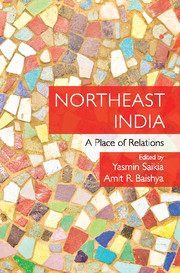Book contents
- Frontmatter
- Contents
- List of Figures
- List of Boxes
- List of Tables
- Acknowledgments
- Introduction
- Section I Contemporary Politics and Issues of Definition
- Section II Creating Presence
- Section III Knowing through Experience
- Section IV Rethinking Politics
- 10 Difficult Loves: Purity and Hardship
- 11 Politics of Difference in the Northeast: A Feminist Reflection
- 12 Robes, Rivers and Ruptured Spaces: Hydropower Projects in West Arunachal Pradesh
- Glossary
- About the Contributors
- Index
11 - Politics of Difference in the Northeast: A Feminist Reflection
from Section IV - Rethinking Politics
Published online by Cambridge University Press: 23 July 2017
- Frontmatter
- Contents
- List of Figures
- List of Boxes
- List of Tables
- Acknowledgments
- Introduction
- Section I Contemporary Politics and Issues of Definition
- Section II Creating Presence
- Section III Knowing through Experience
- Section IV Rethinking Politics
- 10 Difficult Loves: Purity and Hardship
- 11 Politics of Difference in the Northeast: A Feminist Reflection
- 12 Robes, Rivers and Ruptured Spaces: Hydropower Projects in West Arunachal Pradesh
- Glossary
- About the Contributors
- Index
Summary
A politics of difference, a difference from the political and cultural identity of ‘India’, is at the heart of politics in India's Northeast. This politics of difference has been at the centre of a difficult and often violent political struggle that has gone on in this region, as ethno-national groups have mounted several armed struggles demanding sovereignty from the Indian nation-state by claiming nationalities different from an Indian nationality. On its part, the Indian state has engaged with the armed resistances of the region with brutal displays of state sovereignty that seeks to enforce the territorial integrity of India, through counter insurgency measures, most notoriously reflected in the imposition of the Armed Forces Special Powers Act (AFSPA), 1958. This act allows unmitigated powers to the armed forces to conduct counter-insurgency operations with limited provisions for judicial review, which has led to the armed forces acting with impunity. This act works in tandem with other stringent anti-terrorism acts, which are enforced in the rest of the country.
These state security acts work together with other administrative, political and cultural measures to ‘win the hearts and minds’ of the people of the Northeast. For instance, constitutionally, the Indian state has tried to engage with the question of sovereignty by giving more political autonomy to the North-eastern states through special constitutional provisions, such as the sixth schedule for the tribal areas in the region and Article 371 A and Article 371 G operating in the states of Nagaland and Mizoram respectively. These constitutional provisions enable tribal communities to have more political autonomy to govern themselves through their customary laws and have control over ownership, transfer and use of land and its resources. Thus, autonomy has been a way for the Indian state to contain the question of sovereignty.
This mode of governing the Northeast, which combines military and constitutional measures, have spawned their own intricate webs of power between the military, the rebels and local politicians that facilitate fratricidal violence and corruption (Baruah, 2007, 2009). At the moment, after years of what has been called protracted low intensity conflict, not understood as full scale-armed conflict, there is an uneasy ‘peace’ in the Northeast.
- Type
- Chapter
- Information
- Northeast IndiaA Place of Relations, pp. 244 - 261Publisher: Cambridge University PressPrint publication year: 2017



